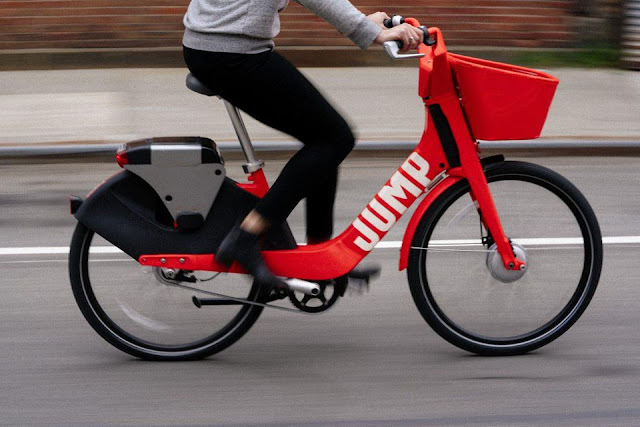As dockless bikes increasingly clutter city sidewalks around America, Uber is spending millions for a part in the next war in transportation.
On Monday, Uber announced that it plans to acquire Jump Bikes, one of several companies which offer pedal-assist e-bikes that don't require docking stations. The terms of the deal were not disclosed, but last week TechCrunch pegged the talks at over $100 million. Jump will become a subsidiary of Uber, with its CEO Ryan Rzepecki reporting directly to Uber's chief, Dara Khosrowshahi.
Jump is one of the players in the new battle between dockless bike-sharing companies. Instead of parking bikes locked into stationary stands around a city, dockless bikes let customers unlock a bike with an app and hop off wherever. Popularized first in China, the space is exploding in the U.S. Jump launched eight years ago as Social Bicycles, but only recently launched its dockless electric bikes under the name Jump. It also raised $10 million from Menlo Ventures and other investors to take Jump's e-bikes national.
companies. Instead of parking bikes locked into stationary stands around a city, dockless bikes let customers unlock a bike with an app and hop off wherever. Popularized first in China, the space is exploding in the U.S. Jump launched eight years ago as Social Bicycles, but only recently launched its dockless electric bikes under the name Jump. It also raised $10 million from Menlo Ventures and other investors to take Jump's e-bikes national.
The company had a previous partnership with Uber after it received an exclusive license to operate in San Francisco. The Uber-Jump deal showed early signs of success, and Khosrowshahi, in his first major acquisition since becoming CEO, swooped in to acquire the bike-sharing startup.
The acquisition is a significant departure from Uber's business strategy. One of the core tenets of the ride-hailing company has been to not own any assets. Uber drivers, for example, own their cars and are in charge of maintenance. Uber simply acts as an app to help match those drivers to riders and facilitate payment.
The bike-sharing business is a different operations model altogether. Jump, like other bike-sharing companies, owns its bikes and as such, is responsible for their maintenance. Certainly, even an e-bike has a much lower price tag than a car, but the bike-sharing space is considered a capital-intensive, money-losing market. While Uber is experienced in battling well-funded competitors, that playbook won't transfer easily once it owns thousands of bikes. Acquiring Jump is a sign that Uber is willing to bet it can build bike-sharing into a business that's not just a drain on its bottom line.


0 comments:
Post a Comment